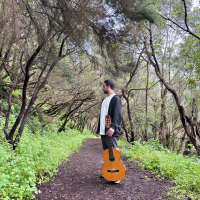Home » Jazz Articles » Interview » Pat Martino: Creative Force
Pat Martino: Creative Force
PM: It really was, but, unfortunately, or maybe even fortunately—t's hard to say in terms of the truth of the matter—I was still going through seizures prior to the operations that eventually took place. And I had a seizure on stage and because of that I couldn't play, in the midst of something that was really, really heavy-duty... it was burnin.' And I stopped for about 30 seconds... and then came back in, you know, when I found my place, when I just... because I was falling through a black hole.
AAJ: Omg. Yeah, I've read about that.
PM: So, I mean that... when I look back at that and I see that and try to relate the value of that or the lack of value in it, I always come to the conclusion that it was what was needed: a moment of silence. And it reminds me of Miles... you know, in many ways.
AAJ: Right.
PM: Where he would just literally stop, and there would be silence there. So I think that that has something to do with it as well.
AAJ: Right.
PM: And for me that was a reality, but I also see an artistic perception with regards to perceiving it in a way that turns it into art.
AAJ: Right. I mean, he was such a master at just getting to the essence of something that...
PM: Sure.
AAJ: Like he made most of the rest of us look like we didn't have a clue.
PM: Sure, absolutely.
AAJ: I guess that's kind of what I was getting at. There's a Stravinsky quote... "Instinct is infallible. If it leads us astray, it is no longer instinct."
PM: Yeah, thats a very interesting...
AAJ: Yeah.
PM: Yeah, if it leads us astray, it's, in my opinion, it has to be a distraction by something that is more powerful than our focal point.
AAJ: Do you feel we can trust our instinct that much?
PM: I think we can. I think we can trust our instincts because no matter what the result is going to be due to it, we're going to learn more about ourselves. And it's going to demand a decision. So each moment that is, in my opinion, that is... that triggers instinct, is also triggering the growth that we're looking for, that is difficult to call, from our experience, something that is a new experience. So, we learn from our instincts, we learn from the mistakes we make, and in fact, they're not mistakes at all, they're the roots of learning.
AAJ: They're part of the growth process.
PM: Yes, exactly, yeah. And I think instinct is necessary for that.
AAJ: Right. There's a couple of your own quotes that I really got a lot out of... "life is short and I have spent far too many years thinking of myself as a guitarist rather than as a human being who among other things played the guitar." It sounds almost regretful. But, how do you deal with that?
PM: Well, I deal with it as—and I still feel the same way—I'm more interested in continuity. Again, you know, the accuracy of being a guitarist, a player is no more important than the accuracy of penmanship. Each moment is nothing but a moment of my life and if I need the guitar to provide the necessity to be accurate, and I don't see that in everything else... then the instrument is a distraction from everything it has given me in life.
AAJ: Right.
PM: So I don't want to see it that way. I'm much more than a guitarist. I enjoy people. I enjoy meeting new individuals. I enjoy experiencing new, you know, new responsibilities. I mean, there are times when ...
AAJ: Having a life...
PM: Yeah, exactly. If you walk out the front door and you go... normally you turn left to go to the mailbox... you can also turn right and walk around the corner and around the block to get to the mailbox.
AAJ: And then you're improvising.
PM: Yeah, then life is improvisation.
AAJ: (laughs).
PM: You know, and in the process, you happen to witness an old lady dropping her bag of groceries and it may fall out of the bag... now you have the opportunity of being a gentleman.
AAJ: That's right.
PM: And you feel better about life. And finally, you get to the mailbox and you drop in the letter that you intended to mail, but look how much you've accomplished and gained ... in the process by being free of mind and at the same time as clear and accurate to what you're enjoying about life itself, which is life itself, you know?
AAJ: You got the chance to be part of humanity at the same time.
PM: Yeah, exactly, exactly.
AAJ: There's another one... "in an insensitive world of competition... the most priceless condition is to share the truth." I really like that one.
PM: Yeah.
AAJ: I guess thats pretty much the bottom line.
PM: Yeah, you know, competitive, anything competitive is strictly based upon marketing and based upon success... with regards to the industry itself. And there's nothing wrong with that, in terms of being part of the whole, you know, the larger sense of what you've set out to do. But in terms of the true value of what you're worth, I don't think it's necessary to compete. I really don't. I think that that's trying to, I don't know, trying to live up to what makes you feel important. You know, competition in that particular sense.
AAJ: Right.
PM: I guess it is important, but then there are moments of intimacy where there is no one else but you and yourself... and you can't compete with that.
AAJ: Right. I mean, if it is only to make you feel important or self-important I think they're missing the mark there.
PM: Yeah, again, you're missing the duty and all of the opportunities. Again, you're going the shortest distance to the mailbox...
AAJ: Every time.
PM: And that's ok sometimes if you have a time appointments, but you have to have the freedom to get away from that... so that you can be closer to fluidity and then you take shape of whatever you're poured into, you know, much like water... or another fluid. As opposed to being as tight as a rock.
AAJ: Right.
PM: And then you can't fit in the space, you know?
AAJ: I mean, sometimes you have to open up and be able to, you know, experience.
PM: Sure.
AAJ: Things like love, even if it does take the longer route.
PM: Yeah, for sure.
AAJ: Yeah. You've been through so much; the operation literally divides your life into two parts. Has your faith in God helped you through this experience?
PM: Yeah, I think so.
AAJ: Getting reacquainted with the guitar and the memory loss and blackouts and all?
PM: For sure. Provisions, you know. I always thank God for what's provided and it seems like some things are always provided when needed.
AAJ: Especially if you have that attitude (laughs).
PM: Yeah, absolutely.
AAJ: Its funny. Its almost... spooky.
PM: Yeah, absolutely. I agree with you.
AAJ: You were also involved with the Koran and Eastern thought.
PM: Well, I was more or less involved with Theosophy, in terms of all of the religions, you know. And to me, that was the most important thing: finding the essence of each of these things, and of course, the main essence to all these things is love and truth, you know, and... I think that's the issue of life.
AAJ: You just answered my next question.
PM: Yeah.
AAJ: Your music always sounds unmistakeably consistant.
PM: Thank you.
AAJ: Yes, you're welcome... the listener knows who it is and not just by the tone or the phrasing but by so many idiomatic devices. How do you go about composing and keeping this identity clearly apparent? Even there, as well.
PM: Les Paul once said to me, you know, 'when you play and the audience reacts, keep it. If you play something and there is no reaction, toss it.
AAJ: That's great!
PM: Yeah, he says, "and if you keep... if you come up with seven of these... then you're in good shape."
AAJ: (laughs)
PM: "And you will never be forgotten."
AAJ: Only seven.
PM: Only seven is what you need.
AAJ: Thats amazing.
PM: And I think he's right on the button.
AAJ: Yeah, well he's been around longer than all of us put together (laughs) I think.
PM: Yeah (laughs).
AAJ: I think he should have it by now.
PM: For sure (laughs).
AAJ: (laughs). You've always had an affinity for symmetrical structures and harmonic movement, things like this...
PM: Yeah.
AAJ: Clarity, organization, precision, etc... is that back to being a Virgo?
PM: Yeah, I think so. I think it's primarily based on logic, the way the instrument's built.
AAJ: A lot of math in there.
PM: Yeah, there is a lot of math if you want to see it that way. It can also be... it could also be seen as mirror images of itself... over and over again.
AAJ: Ok.
PM: And I see it that way.
AAJ: Fractals... that kind of thing.
PM: Yeah, and I'm really very comfortable with it because of that.
AAJ: Yeah... yeah.
PM: So that the entire fingerboard—all 24 to 26 frets of it—is reduced into any one given topic. And then can be divided into multiple, miniature areas of change for that topic.
AAJ: Right. A question just occurred to me... you base so much of the logic of what you've distilled about the guitar into the number: 6, I mean, you know, having to do with the strings and the I Ching and everything... It just occurred to me that what about guitars with more strings: 7 or 8; you know, Charlie Hunter...
PM: Sure. It can be done accordingly in terms of...
AAJ: All that still exists there, of course.
PM: Sure, yeah, sure. It's still applicable to all of that.
AAJ: You just have to re-map it over, I guess.
PM: Exactly. It's the same thing with tunings. You know, the instrument itself is a free... its a free mechanical instrument, you know. Freely mechanical.
AAJ: Absolutely.
PM: So, it can be changed in any way you want to change it. But I think the nature of the guitar itself with regards to the six strings lasted for the longest time, you know, including the classical guitar, and the Blues and Rock guitar. And Jazz, as well. Until recently, it's going up to seven strings, and I forget who it is that has used ten strings. So, in that case, there are exceptions and they're on the margin. But I think that the majority of the instrument and to reduce it into simplicity, because of its logic with the six strings themselves, I think there's a necessity to that. Primarily being that the instrument itself has been established for, you know, centuries... under those conditions.
AAJ: I don't suppose you've worked with tunings too much.
PM: It's been a long time. It has been a long time but I did get involved with different tunings—all the different tunings, as well as, a double neck. When I used the (Ovation) Adamas I originally had the Kaman brothers build me two of them. They built the six string, most likely that I had used when I went to San Antonio...
AAJ: Ok.
PM: And also the, exactly the same color and same, you know, same tools and the same wood and the same graphics... with a double neck. And the top neck was six strings and the bottom neck was six strings. The only difference was the bottom was tuned: EADGBE. And the top neck was EBGDAE; was upside down.
AAJ: What projects are upcoming for you?
PM: There's a number of them... you know, I don't know where to begin.
AAJ: Besides Iridium.
PM: Yeah, I have another session, like I said, coming up with the tribute to Charlie Earland. I just finished a 28 piece big-band album that did... (tape ran out here).
AAJ: Pat, I'd really like to thank you for your time and wish you all the best.
PM: Thank you. My pleasure.
Tags
Interview
Pat Martino
Mike Brannon
george benson
Cecil Taylor
Miles Davis
Ron Thomas
Mike Stern
Ray Charles
John Handy
oscar peterson
Joe Pass
Vancouver
New York City
Wes Montgomery
Philadelphia
benny golson
Larry Goldings
Don Patterson
Jack McDuff
Joey DeFrancesco
Chick Corea
Return To Forever
Weather Report
Les Paul
Charlie Hunter
PREVIOUS / NEXT
Support All About Jazz
 All About Jazz has been a pillar of jazz since 1995, championing it as an art form and, more importantly, supporting the musicians who make it. Our enduring commitment has made "AAJ" one of the most culturally important websites of its kind, read by hundreds of thousands of fans, musicians and industry figures every month.
All About Jazz has been a pillar of jazz since 1995, championing it as an art form and, more importantly, supporting the musicians who make it. Our enduring commitment has made "AAJ" one of the most culturally important websites of its kind, read by hundreds of thousands of fans, musicians and industry figures every month.























